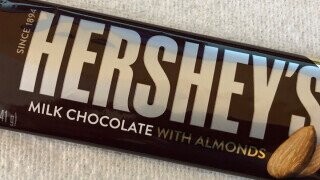Hershey Went To Court To Argue Their Chocolate Is Food, And Lost

It's candy week at Cracked. Prepare for a sugar high.
Words have specific, official definitions. Few people care, except for those of us who enjoy correcting everyone. For example, we're very interested that cucumbers are berries while strawberries aren't, but when we relay this information at parties, no one shares our enthusiasm. "Botanically," we say, "a berry is a fruit derived from a single flower's single ovary!" but everyone else says, "Uh, that makes no difference to me, I'll just go on calling berries berries."
But there's one arena where these definitions make a big difference, and it's one that's otherwise even less interesting than food categorization: tax law. The law taxes some items more than others, so companies have often sued to argue that their product falls under the less-taxed category.
Don't Miss
The most famous case of this was Nix v. Hedden, in which the Supreme Court ruled that tomatoes are a vegetable. More specifically, they said that tomatoes are a fruit under the botanical definition, and there's no arguing with that, but the spirit of the law in question categorized all salad-y foods differently from sweet ones you just grab and bite into.
In 1932, Hershey went to court to argue that their chocolate counts as food. This case had nothing to do with how Hershey's chocolate is inferior to most chocolate worldwide and doesn't even meet the standard definition of chocolate. It had to do with how the law taxes candy—all candy—one way and foodstuffs a different way.
Chocolate isn't candy, said Hershey. Candy is made of just sugar, while chocolate also contains milk solids and maybe even fruit and nuts. Chocolate deserved to be taxed at the same rate as regular food, and so Hershey was owed a refund of $8 million ($130 million in today's dollars).
The case reached the Supreme Court, and Harlan Stone (who'd go on to be chief justice) wrote the decision. They analyzed dozens of laws and past cases and came to the conclusion that candy is a category covering all confectionery, including chocolate, and so chocolate exists separately from regular food.
That wasn't the end of the story. Various confectioners would go on arguing for decades that their specific wares are food, not candy. Today, many states go by a standard that says if it contains flour, it's taxed as a food. That means that a Hershey bar is candy. But Hershey's Cookies 'n' Crème? That's food. As is Twix, Kit Kat, and even Twizzlers.
This fact came from the One Cracked Fact newsletter. Want more like this, straight from your email inbox, without any ads or popups? Join here:
To hear the courts define more words, check out:
5 Insane Ways People Defended Themselves In Court (And Won)
Subway's Bread Isn't Actually Bread, Irish Court Rules
5 Words That Used to Mean the Exact Opposite
Follow Ryan Menezes on Twitter for more stuff no one should see.
Top image: Famartin/Wiki Commons
